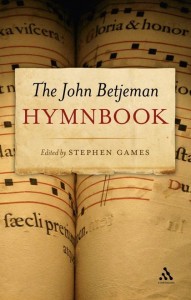Hymns are the poems of the people. From ‘Abide with Me’ to ‘Onward Christian Soldiers’, they provide us with memories of happier, more devout days of Sunday School and school assemblies, or weddings and funerals. They’ve given phrases to the language: ‘change and decay’, ‘bright and beautiful’, ‘soft refreshing rain’, ‘fir and foe’, ‘meek and mild’, ‘God moves in mysterious ways’ and dozens of others. Even today, when it is assumed that we’ve all given up religion, millions of people enjoy programmes on radio and television that consist solely of people singing old familiar tunes.
There are two things you need for a jolly good hymn. The first is a set of words that expresses the mood or sentiment of the worshipper. The second – and perhaps even more important – is a good tune. And by a good tune I don’t mean some frightfully highbrow composition that only an operatic tenor could sing comfortably but a simple popular melody. The fact is, hymn-tunes are the nearest we’ve got to English folk music. When a football crowd wants to find a tune for its unmentionable slogans, as often as not they choose a hymn-tune.
From The John Betjeman Hymnbook, published by Continuum in 2011 (and first published as Sweet Songs of Zion by Hodder & Stoughton in 2007, taken from Betjeman’s radio series of the same name in 1975).
Rowan Williams
George Herbert is the only unquestionably major English poet to have made a significant contribution to the repertoire of English hymns. Four of Herbert’s poems appear regularly in hymn lists – ‘Antiphon’ (‘Let all the world in ev’ry corner sing’), ‘The Elixir’ (‘Teach me, my God and King’), ‘Praise II’ (‘King of Glorie, King of Peace’) and the psalm paraphrase ‘The God of love my shepherd is.’ There are of course some other English poets whose work appears in hymnals. Robert Bridges is well represented in the English Hymnal as a translator and adapter; but few would argue that he is a poet of the first rank. A poem of William Blake’s (‘To Mercy, Pity, Peace, and Love’) is included in the same hymnal and its more modern versions, though it has never quite won the hearts of congregations and needs some political correcting for the twenty-first century (references to ‘heathen, Turk, or Jew’ are not well-received these days). The same author’s ‘Jerusalem’ is now also a regular in hymn collections, despite (or because of?) its triumphantly eccentric mythology and metaphor. And then there is Tennyson. ‘Strong Son of God, Immortal Love’ is in fact a section of In Memoriam, and its wording, carefully read, reflects the poet’s troubled and tentative speculation rather than any clear doctrinal content (‘Thou seemest human and divine’); it is not too surprising that it is rarely sung these days (was it ever?).
In short, hymnody in English has not often been written by serious poets.
From Hymns, Poems, Songs: The Lyrical and the Liturgical. This address was given on July 27, 2015 in Cambridge, England at the joint conference of the Hymn Society in Great Britain and Ireland, the Hymn Society of the United States and Canada, and the Internationale Arbeitsgemeinschaft für Hymnologie.

